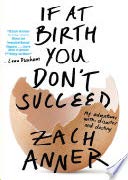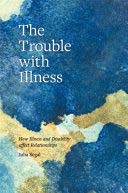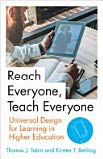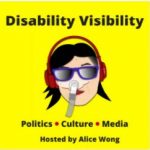July 26 is National Disability Independence Day, a federally recognized day to celebrate the 1990 signing of the Americans with Disabilities Act (ADA). View a sample of books in the library, films on Kanopy and podcasts that recognize Disability Independence Day below.
Books in the Library
 Born at the Right Timeby Ron McCallum
Born at the Right Timeby Ron McCallum
Ron McCallum has been blind from birth. When he was a child, many blind people spent their lives sheltered, but Ron’s mother had other ideas for her son. She insisted on treating him as normally as possible. Ron recounts his social awkwardness and physical mishaps and shares his early fears that he might never manage to have a proper career, find love or become a parent. He has achieved all this and more, becoming a professor of law at a prestigious university and committee chair at the UN.
 If at Birth You Don’t Succeedby Zach Anner
If at Birth You Don’t Succeedby Zach Anner
Comedian Zach Anner entered the world with cerebral palsy and an uncertain future. But he lives by the mantra: when life gives you a wheelchair, make lemonade. Whether recounting a valiant childhood attempt to woo Cindy Crawford, encounters with zealous faith healers, or the time he crapped his pants mere feet from Dr. Phil, Zach shares his fumbles with unflinching honesty and characteristic charm. If at Birth is a hilarious memoir about finding your passion and your path even when it’s paved with epic misadventure.
 The Trouble with Illnessby Julia Segal
The Trouble with Illnessby Julia Segal
This book explores the effects a challenging disability or illness can have on the mind and personal relationships, and how friends, family and professionals can help. Illness or disability can isolate people. Friends and family can find themselves saying the wrong thing or awkwardly avoiding topics as a result. The insights and advice offered in this book can help children and adolescents overcome anxiousness caused by a parent’s condition, improve communication between partners and family members, and increase friends’ awareness of how their disabled friend feels about their situation.
 T elling Deaf Lives: Agents of Changeby Kristen Snoddon
T elling Deaf Lives: Agents of Changeby Kristen Snoddon
Deaf community historians share diverse stories of deaf individuals in this collection. Melissa and Breda describe the Cosmopolitan Correspondence Club, a group of deaf individuals who corresponded in the early 20th century from Australia to Western Europe to the United States; Ulla-Bell recounts first-hand growing up deaf in Sweden and her process in authoring six memoirs; Tatiana writes about her deaf family’s experience during the World War II siege of Leningrad; others look at the evolution of ASL poetry by analyzing works of prominent ASL poets Valli, Cook, and Lerner.
 Reach Everyone, Teach Everyone: Universal Design for Learning in Higher Educationby Thomas J. Tobin
Reach Everyone, Teach Everyone: Universal Design for Learning in Higher Educationby Thomas J. Tobin
Advocates for the rights of people with disabilities have worked hard to make universal design in the built-world “just part of what we do.” For example, captioned instructional videos benefit learners with hearing impairments but also the student who worries about waking her young children at night. This book is aimed at faculty, disability support providers, student-service staff and campus leaders who want to strengthen the engagement, interaction, and performance of all college students.
 HandiLand: The Crippest Place on Earthby Elizabeth Wheeler
HandiLand: The Crippest Place on Earthby Elizabeth Wheeler
A look at young adult novels, fantasy series, graphic memoirs, and picture books in which characters with disabilities take center stage for the first time. These books take what others regard as weaknesses — for instance, Harry Potter’s headaches or Hazel Lancaster’s oxygen tank — and redefine them as part of the hero’s journey. HandiLand places this movement from sidekick to hero in the political contexts of disability rights movements. HandiLand moves through the public spaces young people with disabilities have entered, including schools, nature, and online communities.
 Golem Girlby Riva Lehrer
Golem Girlby Riva Lehrer
In 1958, Riva is one of the first children born with spina bifida to survive. Her parents and doctors are determined to “fix” her, sending the message over and over again that she is broken. That she will never have a job, a romantic relationship, or an independent life. Enduring countless medical interventions, Riva tries her best to be a good girl and a good patient in the quest to be cured. Everything changes when, as an adult, Riva is invited to join a group of artists, writers, and performers who are building Disability Culture.
 eQuality: the Struggle for Web Accessibility by People with Cognitive Disabilities by Peter Blanck
eQuality: the Struggle for Web Accessibility by People with Cognitive Disabilities by Peter Blanck
Never before have the rights of people with disabilities aligned so well with information and communication technologies. This book is about the lived struggle for disability rights, with a focus on the web, for people with cognitive disabilities, like intellectual disabilities, autism or print-related disabilities. The principles derived from the right to the web – freedom of speech and individual dignity – are bound to lead towards full and meaningful involvement in society for persons with cognitive disabilities.
Films in Kanopy


 Explore movies in Kanopy for free. Go to nmc.kanopy.com and login using your NMC ID and password.
Explore movies in Kanopy for free. Go to nmc.kanopy.com and login using your NMC ID and password.
Beyond the Library: Podcasts
 This is life from a disabled lens. Hosted by San Francisco night owl, Alice Wong, featuring conversations on politics, culture, and media with disabled people. If you’re interested in disability rights, social justice, and intersectionality, this show is for you.
This is life from a disabled lens. Hosted by San Francisco night owl, Alice Wong, featuring conversations on politics, culture, and media with disabled people. If you’re interested in disability rights, social justice, and intersectionality, this show is for you.
Disability Visibility is a production of the Disability Visibility Project, an online community dedicated to creating, sharing, and amplifying disability media and culture.
 This is a podcast that looks at disability stories. It’s like sitting down with a really close friend to have real conversations about disability, sexuality and everything else about the disability experience that we don’t talk about; the things about being disabled that we keep in the dark.
This is a podcast that looks at disability stories. It’s like sitting down with a really close friend to have real conversations about disability, sexuality and everything else about the disability experience that we don’t talk about; the things about being disabled that we keep in the dark.
The show is hosted by disability awareness consultant Andrew Gurza.
 The Accessible Stall is a disability podcast hosted by Kyle Khachadurian and Emily Ladau that keeps it real about issues within the disability community. Because they each have different disabilities and mobility levels, they approach everything from two unique viewpoints, offering a fresh insight into how differences in disability can color your experiences and perspectives. They never shy away from offering our honest opinion. Even if they go against the grain of the disability community at large, they always speak our minds.
The Accessible Stall is a disability podcast hosted by Kyle Khachadurian and Emily Ladau that keeps it real about issues within the disability community. Because they each have different disabilities and mobility levels, they approach everything from two unique viewpoints, offering a fresh insight into how differences in disability can color your experiences and perspectives. They never shy away from offering our honest opinion. Even if they go against the grain of the disability community at large, they always speak our minds.

